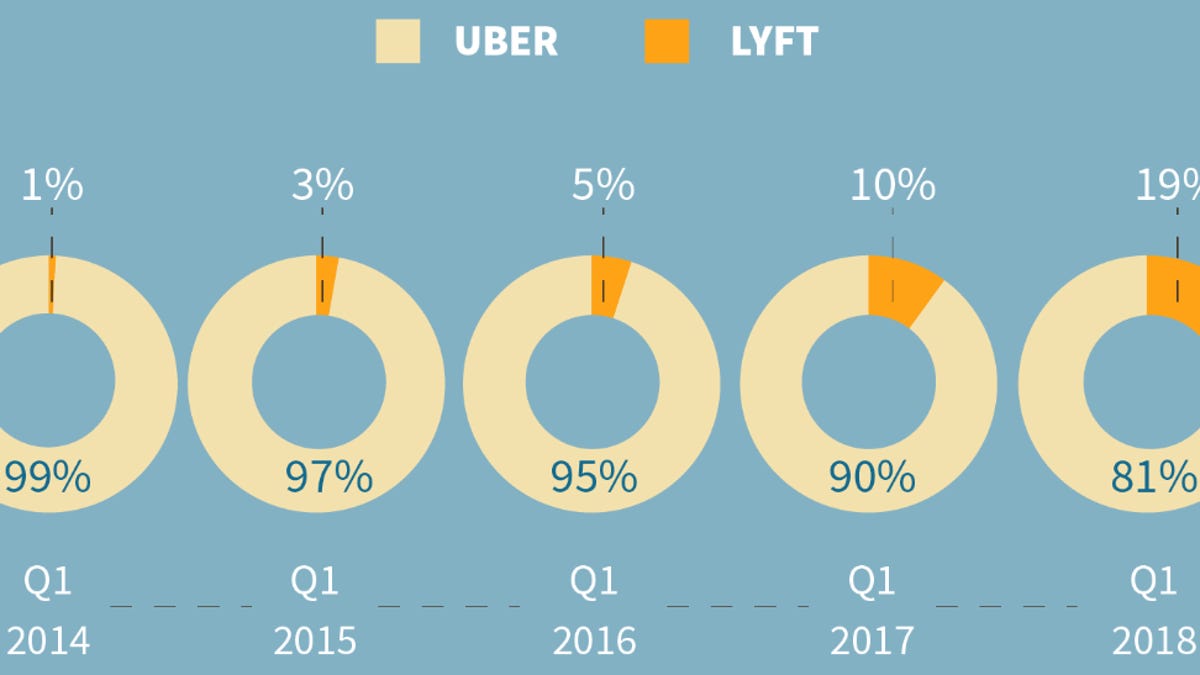Lyft edges in on Uber when it comes to business travelers
As Uber crushes the ride-hailing market, it still lost nine percent of business passengers to Lyft, according to Certify's new report. It's looking even more bleak for taxis.

Year after year, Certify says Lyft has gradually gained on Uber with business passengers.
Uber dominates the ride-hailing world when it comes to US business travelers. But, it's been steadily losing ground to Lyft.
Lyft nearly doubled its market share of business travelers in the US over the last year -- going from 10 percent market share in the first quarter of 2017 to 19 percent market share for the same time period in 2018. The numbers come from a new report released Monday by Certify, a management software company that tracks business expenses and travel receipts.
Lyft's gains mean Uber's loss. Uber saw a 9 percent decline of business travelers in the US over the last year, according to Certify. Uber owned 99 percent of the business passenger market for ride-hailing in 2014, but over the years that number has gradually decreased. The company now has 81 percent of business travel market share.
"Lyft's jump is the biggest surprise of Q1," Robert Neveu, CEO of Certify, said in an emailed statement. "As Uber experienced change in its senior leadership team and challenges in various markets, Lyft stayed the course and gained market. It will be very interesting to see if Lyft is able to maintain this level of usage in the business travel space."
Uber has long been the largest ride-hailing service in the US. But it went through a major shakeup over the last year, which included a complete reset of its leadership. During that time, Lyft was able to take advantage of the situation and make inroads with its service. Lyft's coverage is now nearly as expansive as Uber with drivers in all 50 states.
"Certify's newest report illustrates significant market share gains and why Lyft is becoming a preferred choice for business travelers across the country," David Baga, Lyft's chief business officer, said in an emailed statement. "We will carry this momentum into the rest of 2018 and remain focused on making business travel easy, accessible and affordable."
While Lyft appears to be going strong, Certify's report may not be telling the full story. The receipt tracking company doesn't appear to account for all international business travelers. This is notable because Uber's service is in about 75 countries worldwide, while Lyft is just in the US and Canada. The report also might not include receipts processed through automated centralized billing systems.
"We are seeing more organizations partner with Uber for Business because we can provide a centralized bill," said Michael Goodwin, head of business development for Uber for Business, said in an emailed statement. This "eliminates the need for rides to flow through expense platforms in the first place."
While Uber and Lyft duke it out, the area that's seen the most significant decline is taxi use, according to Certify. In 2014, taxis accounted for 37 percent of ground transportation services for business travelers. That number has dropped year after year and now is in the single digits at just 6 percent.
Car rentals for business passengers have also plummeted from 55 percent in 2014 to 23 percent in the first quarter of this year, Certify reported. As for the ride-hailing market overall (with Uber and Lyft combined), it now has 71 percent of the ground transportation market share. That's an increase of 63 percent since 2014.
Certify analyzed more than 10 million receipts and expenses in the first quarter of 2018 for its new report.
Tech Culture: From film and television to social media and games, here's your place for the lighter side of tech.
Batteries Not Included: The CNET team shares experiences that remind us why tech stuff is cool.

